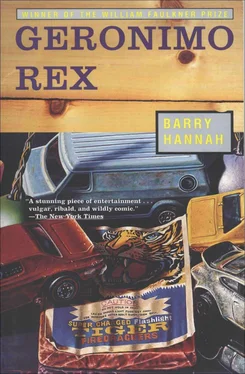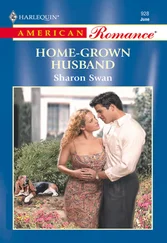“Harry? Did you get drunk, Harry? Are you happy , honey?”
I wanted to speak but I gave out a disconsolate mating sound.
“Now dar ling,” she said. “You’re too handsome to sound like that. What are your hands doing? I have never liked that stuff. I want you to whisper …”
“Help me. Help me!” I moaned, looking at my hands, sinking to the posture of a crab, my mind drowning. Her voice always drowned my mind in one way or another. I tried to rise. Her heart feltness , I couldn’t stand it.
“I want you to whisper and to kiss. You know how to do that.”
“I can’t. I feel stupid and silly. To prime you and start you up like a motor. I feel like I’m reading directions to something.”
“But love isn’t any of that. Love is … romance. I’ve learned that, darling. Love is becoming softly intoxicated. Love is two hearts beating together. Love is sacred.”
“That sounds like a list , Prissy. Where did you get that?” I knew she read Cosmopolitan and maybe the labels on a couple of perfume bottles. I had hurt her feelings. She clouded up and cried, while she held her feet and rocked on her fanny.
“A list ?! It was a Poem. For you .”
“Well it was a nice list, Prissy. Darling,” rolling my mind right down Valentine alley, “Love is holding hands, too.”
You were not supposed to know Dr. Lariat. He talked at length to advanced graduate students outside of class, occasionally, but you were supposed to wait in the wings for a couple of years, attending his classes, and try not to break wind during the lectures, as they say. Then he might begin speaking to you in full sentences. He might tell you of his war experiences.
At one point, in the taking of Italy, there were complaints about wanton destruction by artillery of precious structures of the Middle Ages and the Renaissance. Lariat had been in Italy before. They put him in a jeep and ran him around to vantage points and let him suggest what monuments to spare. He made the rank of captain doing this. He would tell them, hating the sun, making a roof over his eyes with his hands, that behind that wall there was a fine bust done by Vigoro Oleo. The Germans found out about him, and would crowd around precious Italian artworks and blast away joyfully. Some were taken prisoner hanging flat on these artworks like leeches and calling out Lariat’s name. The German radio called out his name as a noble exception to the swarm of ruffian hobos from America calling themselves an army. The jeep would also take him back to town councils and priests so that he could explain that everything was being done to spare the priceless heritage of Italy. He spoke Italian and French, and knew the essentials of German, Spanish, and Russian. Three of the languages he had learned, academically at least, while being bored at Dream of Pines high school. One night as he was walking on the street at dusk with his face in a book, some Dream of Pines person jumped out of an alley and slugged him.
“Is Oliver Sink still there?” asked Lariat.
“Our house is right next to his.”
“He’s the one who hit me. He was angry with me the afternoon before because I’d got so mad with him I blessed him out in French. The naughtier words.”
“Do you know my father? He would have been a little older.”
Lariat stole a direct glance at me. He could really scour one, with that crisp, temporary smile boosted on his lips. “His name was Ode Elann Monroe. That lingering name. Yes. What has he done besides have you?”
“Has the mattress factory.”
“He isn’t literary?”
“No. Well, I think he wanted to be.”
“He wanted very much to be,” said Lariat. I didn’t know what he thought of my father, and didn’t want to follow it up. I thought Lariat might despise him.
“And Oliver Sink, he has, or had, peacocks. They used to come over in our yard.”
Lariat, well, he struck his brow. His eyes were unbelieving.
“No! Peafowl! He can’t have them. I have peafowl. Yesterday the neighbor’s brats were shooting at them with an air rifle. I would have killed them if their mother hadn’t come out. I tore the air rifle into a thousand parts.”
I went in Roger’s Recreation Friday afternoon, as usual, to have a beer and read the Tulsa paper. Roger is a basket-ball player two and a half decades out of training. The trophies won by his team sit in a high clutter on a shelf over the bar; he only bets on his city-league team now. As I said before, he was a saint about holding my worthless checks until I could pay for them. His place was dominoes, pinball machines, and, mainly, snooker and pool tables going far back into the long gray and green. In there, my soul could sit down and expand.
Down past the bar I caught sight of Lariat. He was playing the tan-felted snooker table nearest the bar all by himself. On Roger’s color television, the FM station was going with a Rolling Stones tune played by an orchestra of ancient studio hacks. Lariat seemed unaware of anything but his shots. He bent and shot like he had known how to shoot very well at one time. Then he came over to the end of the bar and poured out a low amount of beer into a pilsner, from the bottle of Jax. Beside the bottle there was a pack of Picayunes. Picayunes, more than Camels, are cigarettes for men who want a real smoke.
“Dr. Lariat?” I said.
“Oh. Get a cue.”
“I’ve never seen you down here.”
“I’ve never been here before. What’s your first name — Ode?”
“Harry.”
“Oh. Do you know the game? This is a sport I used to love in Dream of Pines, and even more in the army. The red balls count one point. You must shoot in a red ball before each number ball you wish to shoot. Shoot for position on the higher numbered balls. When all the red balls are down, you play regular rotation on the two through seven balls. A snooker is made when—”
“I know.”
We shot five games and he beat me all of them. After the games he would shoot the old shark six-railer with the cue-ball and sometimes it would go in. We played for the price of the games—300—and I had to go up and write a counter check to Roger to cover the last two. And the beer. We drank the last one. Lariat kept the crisp smile on his face and said nothing. He had not taken off the coat of his suit.
Lariat had money. He flew to New York and London to see the theater. During the summer he would fly off and tour continents. Leslie Bill Harrow said he went to visit all the famous and little-known ruins of the world. No one knew what he did when he got to the ruins. He was one of the first tourists that the Soviet Union let in. He had seen the church over Tamburlaine’s tomb. Some years ago he was hurt in a jeep-wreck seeking some ruin in middle Africa and came back to Fayetteville in a cast. Further about the money, he had loaned money to a few graduate students who had been at the university many years. The ones I knew he lent to were aging fellows who somehow could not get the degree and detach themselves from Fayetteville.
Hoyd sat next to me in Lariat’s class. Hoyd was pockmarked and over thirty. He had let his hair grow out to the length of his shoulders and looked like a medieval tramp. He worshiped Lariat. Lariat had loaned him money. He would cringe and wrinkle his nose and lay his head on the desk, looking at me, after the boy up front asked Lariat a question. “Why is James like a cathedral?” Hoyd cut forth a strangled hoot out the side of his teeth and eyed me hysterically. Apparently he knew something about what Lariat would say. During Lariat’s pause he wrung his hands and pumped his face up and down. He loved the pause. “James wanted to be buried in the grave of his own church. The church was his fiction, his own writing. Nothing else was baroque or miraculous or, well, sanitary enough,” Lariat said. Hoyd squeaked with approval, looking at me for support.
Читать дальше












